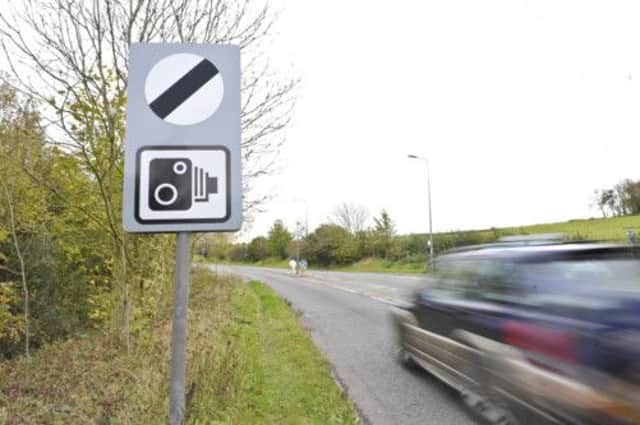Shetland the home of the nation’s slowest cars


But motorists on the archipelago have been named among the slowest on four wheels in the UK.
A survey of almost 60,000 motorists found only drivers in Durham and Portsmouth have slower vehicles than those in Lerwick and beyond.
Advertisement
Hide AdAdvertisement
Hide AdThe research found drivers in London, who must contend with some of the most congested roads in the UK, own the fastest cars.
In contrast, motorists in Shetland and Galashiels in the Borders were named among those owning more ‘slow’ cars less likely to break the speed limit.
Drivers were asked to review their cars online and describe their relationship with their vehicles.
Motoring journalist Sue Baker, who helped co-ordinate the survey, said: “Whenever I have been to Shetland I have always been struck by the scenery and how beautiful it is, so maybe that’s why people are not driving around as fast – you don’t feel the same need to rush about.
“People living there have to go further afield to get their hands on a really exotic car, but it may be they feel less need to own one, especially given the local terrain.”
Earlier this year, research by Citroen found islanders less likely to own convertibles than drivers elsewhere in the country.
The Western Isles had just 56 convertibles registered to the islands’ 26,200 residents last year – a ratio of one drop-top for every 468 islanders. Shetland and Orkney did not fare much better, coming second and third from bottom in the survey of UK local authority areas, with one convertible car for every 393 Shetlanders, and one for every 365 Orcadians.
The top spot for convertibles was Elmbridge in Surrey, where the ratio is 1:25.
Advertisement
Hide AdAdvertisement
Hide AdGary Robinson, leader of Shetland Islands Council, said that with the price of petrol and diesel topping £1.50 a litre, drivers on the islands were keen to travel as “frugally” as possible.
“We’ve no motorways and a lot of single track roads,” he said. “The main roads north and south on the island are pretty good, but once you get off the main routes there’s quite a lot of twisty single tracks. I think there’s a difference in the pace of life here, but another thing I have noticed is that an awful lot of people are on an economy drive due to the cost of fuel.
“People are trying to get as much out of a gallon of petrol as they can. I think that might be a significant factor in this.”
The survey, by weloveany car.com, also found car owners living in Greater Manchester’s Cheadle to be the motorists most in love with their cars.
Pickering in North Yorkshire, Ellesmere Port, Middlesbrough and Dover were named as places where people are happiest with their cars when asked to review them on various factors such as comfort, reliability and whether they would recommend to others.
Top five fastest car drivers in the UK
1 City of London
2 Guernsey
3 Jersey
4 Central London
5 West London
Top five slowest drivers in the UK
1 Durham, County Durham
2 Portsmouth, Hampshire
3 Shetland
4 Sunderland, Tyne and Wear
5 Oldham, Greater Manchester
Paul Riddell: ‘The slow speeds cannot be due to a lack of horsepower’
It’s very simple. When you get into your car in Shetland and indulge in the local pastime of going for a “run”, it’s not long before you are all out of road.
Nowhere in Britain’s most northerly islands is more than three miles from the sea.
Advertisement
Hide AdAdvertisement
Hide AdAnd with one or two notable exceptions, there are no long stretches of straight road.
So driving is all about going up and down hills and round the bend(s).
The slow speeds identified in the survey certainly cannot be attributed to lack of horsepower.
Shetland is an affluent place, with more than its fair share of Audis, BMWs and Mercs.
Also, it would seem to be compulsory for builders and crofters to own 4x4s with an engine capacity well above two litres.
Counter-intuitively, Shetland also has a high volume of traffic.
Commuters generally either head for the main town, Lerwick, or Sullom Voe, where Europe’s largest oil terminal is located.
The French oil firm Total is currently building a new plant adjacent to the terminal to handle gas that will soon be piped in from west of Shetland.
Advertisement
Hide AdAdvertisement
Hide AdSo in addition to the normal flow of traffic, these days the northern part of Mainland teems with buses, 4x4s and lorries delivering workers and materials to the plant.
Then there are the notorious Lerwick roundabouts.
I was brought up in Shetland and left as a teenager to go to university in the late 1980s.
By the time I returned to live in 2008, several roundabouts had been built.
To be frank, some drivers have yet to grasp the basic concept of giving way only to traffic from the right at these intersections. Instead, they will wait until the roundabout is entirely clear of cars before pulling out.
If I had a pound for every time I’ve been stuck behind one of them...
• Paul Riddell is a former editor of the Shetland Times